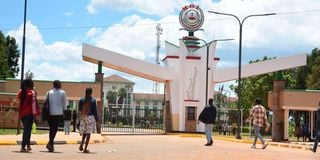Premium
Moi University taps solar power for lower operational costs, climate mitigation

The entrance to Moi University's main campus in Kesses, Uasin Gishu County on February 08, 2024.
What you need to know:
- Prof Kosgei disclosed that apples are cultivated at the institution's farm, and the produce is expected to hit the market within the next few months. The institution targets expanding production from the current 100 acres to over 500 acres in the next two years.
- The institution also intends to invest in pig, dairy, and poultry farming and revive Elimu millers to help raise funds to sustain its operations in the wake of dwindling capitation from The National Treasury.
Cash-strained Moi University is investing in renewable energy to cut down on operational costs and mitigate climate impacts as it grapples with a liquidity crunch that threatens smooth learning.
The university, currently dogged by a financial crisis amid capitation hitches, ballooning wage bills, and high operational costs, is collaborating with RheinMain University of Applied Sciences in Germany to invest in solar energy. This is ultimately aimed at raising revenue and reducing greenhouse gas emissions.
The project will be implemented in stages. The first phase will cost Sh5 million and target the production of 55 kilowatts of clean energy.
"The implementation of the first phase will last three months and cover the administration unit, while the second phase, costing Sh10 million, targets to produce 100 kilowatts covering kitchen, hostels, and water pumping," disclosed Afriwatt Engineering Managing Director, Eng. Thomas Cheruiyot.
Afriwatt Engineering Limited has been contracted in partnership with RheinMain University and the Catholic Diocese of Mainz, Germany, through the Catholic Diocese of Eldoret to generate 30 Megawatts of renewable energy at its main campus by 2050.
The university spends approximately Sh16 million monthly on electricity, and installing solar energy will reduce the costs to less than Sh10 million monthly.
"The university holds a significant opportunity to harness solar energy effectively. The project will offer training and research purposes and a demonstration centre for various renewable energy technologies," said Moi University Vice Chancellor, Prof Isaac Kosgey.
Once complete, the multi-billion project is projected to cover 200 acres with solar panels. The excess energy produced will be used to produce eco-friendly fertilizers and help mitigate the effects of climate change.
"The University endeavours to position itself as a leading premier hub for research in Green Hydrogen, Ammonia, eco-friendly Fertilisers, and green aviation fuels across the African continent," added Prof Kosgey.
In the project's initial phase, several buildings within the main campus will be decarbonised.
The university has been dogged by a deep financial crisis due to capitation hitches and is staring at a crisis after its employees went on strike over delayed salaries and other payments.
The Universities Academic Staff Union (Uasu), Kenya University Staff Union (Kusu), and the Kenya Union of Domestic Hotels Educational Institutions Hospitals and Allied Workers (Kudehiha) have gone on strike to protest against delayed salaries, non-remittance of bank loans, pensions, and other third party deductions.
They are demanding the overhaul of the university administrative management and council over alleged mismanagement.
"Due to non-remittance of third party deductions, workers who have bank loans have been taken to courts over defaults, causing them a lot of mental anguish as they are likely to lose their property to recover the money," said Bob Odhiambo Ng'ura the Kusu, Moi University Branch Chairman.
Some staff, who secured loans from financial institutions, but have defaulted to repay the money may have their property auctioned after the management failed to remit statutory deductions.
About 124 members of Kusu have been sued by the banks and microfinance institutions over failure to service the loans amounting to millions of shillings through the check-off systems.
Some of the suits have been filed in the Small Claims Courts in Eldoret Law Courts, while others have received demand notices to either repay the loans or have their property auctioned to recover the money.
Among factors contributing to the financial woes facing the institution is the declining student enrolment from 50,000 in 2015 to 27,000 in 2021, closure of non-viable campuses, reduced exchequer funding due to the implementation of differentiated Unit Cost (DUC) in computing the recurrent capitation and rising cost of personnel enrolment due to National Collective Bargaining Agreements (CBAs) that have not been fully funded.
"With the decline in student numbers and the subsequent closure of non-viable campuses, the university maintained the staff despite the closure of subsequent campuses and a decline in revenue," said the Vice-chancellor in an earlier memo
The institution of higher learning has embarked on income-generating activities to raise funds to sustain its operations and contribute to the country's food security.
Prof Kosgei disclosed that apples are cultivated at the institution's farm, and the produce is expected to hit the market within the next few months. The institution targets expanding production from the current 100 acres to over 500 acres in the next two years.
The institution also intends to invest in pig, dairy, and poultry farming and revive Elimu millers to help raise funds to sustain its operations in the wake of dwindling capitation from The National Treasury.





